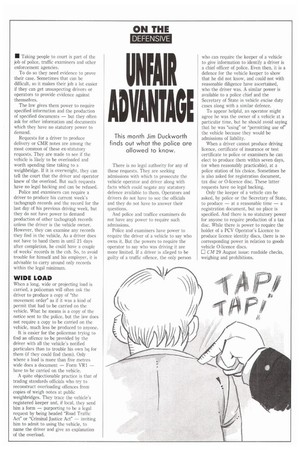ONO AMMAN
Page 36

If you've noticed an error in this article please click here to report it so we can fix it.
This month Jim Duckworth finds out what the police are allowed to know.
• Taking people to court is part of the job of police, traffic examiners and other enforcement agencies.
To do so they need evidence to prove their case. Sometimes that can be difficult, so it makes their job a lot easier if they can get unsuspecting drivers or operators to provide evidence against themselves.
The law gives them power to require specified information and the production of specified documents — but they often ask for other information and documents which they have no statutory power to demand.
Requests for a driver to produce delivery or CMR notes are among the most common of these ex-statutory requests. They are made to see if the vehicle is likely to be overloaded and worth spending time taking to a weighbridge. If it is overweight, they can tell the court that the driver and operator knew of the overload. But such requests have no legal backing and can be refused.
Police and examiners can require a driver to produce his current week's tachograph records and the record for the last day of his previous driving week, but they do not have power to demand production of other tachograph records unless the driver is the vehicle owner. However, they can examine any records they find in the vehicle. As a driver does not have to hand them in until 21 days after completion, he could have a couple of weeks' records in the cab. So, to avoid trouble for himself and his employer, it is advisable to carry around only records within the legal minimum.
WIDE LOAD
When a long, wide or projecting load is carried, a policeman will often ask the driver to produce a copy of "the movement order" as if it was a kind of permit that had to be carried on the vehicle. What he means is a copy of the notice sent to the police, but the law does not require a copy to be carried on the vehicle, much less be produced to anyone.
It is easier for the policeman trying to find an offence to be provided by the driver with all the vehicle's notified particulars than to trouble his own hq for them (if they could find them). Only where a load is more than five metres wide does a document — Form VR1 — have to be carried on the vehicle.
A quite objectionable practice is that of trading standards officials who try to reconstruct overloading offences from copies of weigh notes at public weighbridges. They trace the vehicle's registered keeper and, if local, they send him a form — purporting to be a legal request by being headed "Road Traffic Act" or "Criminal Justice Act" — inviting him to admit to using The vehicle, to name the driver and give an explanation of the overload. There is no legal authority for any of these requests. They are seeking admissions with which to prosecute the vehicle operator and driver along with facts which could negate any statutory defence available to them. Operators and drivers do not have to see the officials and they do not have to answer their questions.
And police and traffice examiners do not have any power to require such admissions.
Police and examiners have power to require the driver of a vehicle to say who owns it. But the powers to require the operator to say who was driving it are more limited. If a driver is alleged to be guilty of a traffic offence, the only person
who can require the keeper of a vehicle to give information to identify a driver is a chief officer of police. Even then, it is a defence for the vehicle keeper to show that he did not know, and could not with reasonable diligence have ascertained, who the driver was. A similar power is available to a police chief and the Secretary of State in vehicle excise duty cases along with a similar defence.
To appear helpful, an operator might agree he was the owner of a vehicle at a particular time, but he should avoid saying that he was "using" or "permitting use of' the vehicle because they would be admissions of liability.
When a driver cannot produce driving licence, certificate of insurance or test certificate to police or examiners he can elect to produce them within seven days, (or when reasonably practicable), at a police station of his choice. Sometimes he is also asked for registration document, tax disc or 0-licence disc. These latter requests have no legal backing.
Only the keeper of a vehicle can be asked, by police or the Secretary of State, to produce — at a reasonable time — a registration document, but no place is specified. And there is no statutory power for anyone to require production of a tax disc. While there is power to require the holder of a PCV Operator's Licence to produce licence identity discs, there is no corresponding power in relation to goods vehicle 0-licence discs.
0 CM 29 August issue: roadside checks, weighing and prohibitions.












































































